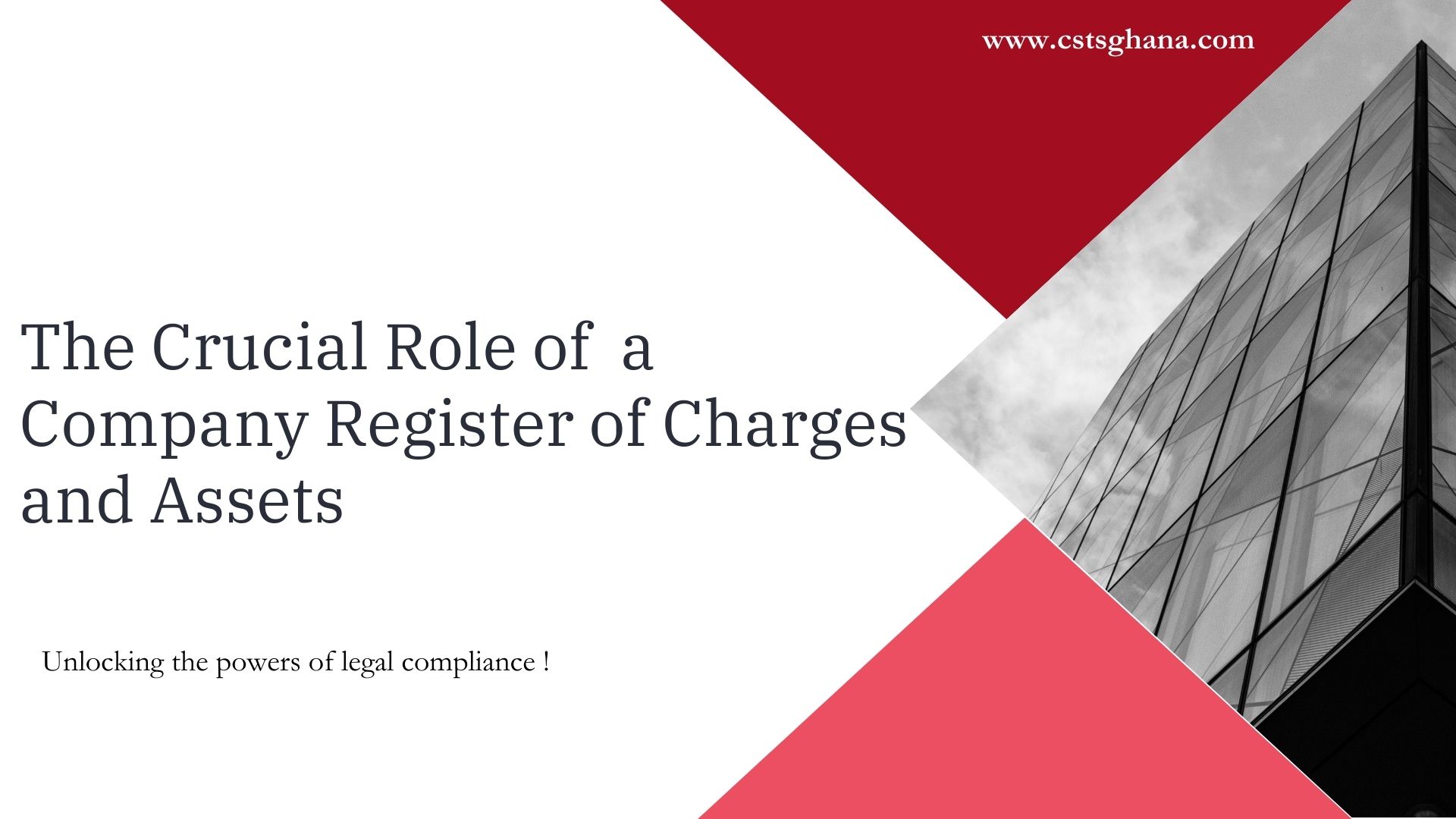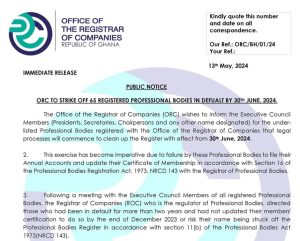In the ever-evolving business landscape of Ghana, the establishment of a Comprehensive Company Register of Particulars of Charges and Assets is essential for fostering transparency, legal compliance, and effective corporate governance. This register serves as a vital tool for both businesses and regulatory authorities, facilitating the documentation of financial commitments and assets. This article delves into the pressing need for a Company Register of Charges and Assets in Ghana and its myriad advantages to the corporate sector.
Legal Compliance and Regulatory Obligations
The Companies Act, 2019 (Act 992),[1] mandates companies to deliver particulars of charges within forty-five days of the creation of the charge to the registrar for registration. This details the encumbrances on the company’s assets. A charge includes a security on property or a mortgage whether legal or equitable statement to the effect that it is a true and complete copy of the original or an accurate translation of the original, under the seal of the company or signed by a Director and the Company Secretary. [2] The particulars requiring delivery for registration under this section are [3]
(a) the date of creation of the charge;
(b) the nature of the charge;
(c) the amount of money secured by the charge, or the maximum sum of money secured by the charge per section 111 of the Companies Act, 2019 (Act 992)
(d) short particulars of the property charged;
(e) the persons entitled to the charge;
(f) in the case of a floating charge, the nature of a restriction on the power of the company to grant further charges ranking in priority to, or at the same rate with, the charge created by the registration; and
(g) particulars of any variation of the terms and provisions of a charge.
A company shall keep a copy of every instrument creating a charge of which particulars require to be registered under sections 110 to 113, at the registered office of the company and at any other office in Ghana at which the register of debenture holders is kept; but in the case of a series of uniform debentures, a copy of one debenture of the series is sufficient.[4]
This legal requirement underscores the importance of transparency and accountability in financial dealings. By keeping an accurate and up-to-date Register of Particulars of Charges, with the Registrar,[5] businesses in Ghana demonstrate adherence to statutory obligations, minimizing legal risks and potential repercussions.
Protection of Stakeholder Interests
The register serves as a safeguard for stakeholders, including creditors, investors, and shareholders. By documenting charges against company assets, creditors can assess the financial standing of the company before extending credit. This transparency helps protect the interests of all stakeholders by providing a clear picture of the company’s financial commitments, ensuring that decisions are made with a comprehensive understanding of the potential risks involved.
Access to Financial Information
Maintaining a Register of Particulars of Charges with the Registrar and keeping copies at the registered office of the company facilitates easy access to critical financial information. This comprehensive record allows internal and external stakeholders, such as auditors and regulatory bodies, to evaluate the financial health of the company. Timely access to accurate financial data is instrumental in making informed decisions, identifying potential challenges, and formulating effective strategies for sustainable business growth.
Facilitating Due Diligence Processes
In the context of mergers, acquisitions, or business partnerships, a well-maintained register plays a crucial role in due diligence processes. Prospective investors or partners can review the company’s financial commitments and assets, making informed decisions about the level of risk involved. This transparency fosters trust and confidence among potential collaborators, contributing to smoother negotiations and successful business transactions.
Monitoring Changes in Asset Status
The Company Register of Particulars of Charges and Assets enables companies to monitor changes in the status of their assets. Whether it be the acquisition of new assets, changes in ownership, or the release of charges, a well-maintained register provides an accurate historical record. This ensures that the company’s leadership and stakeholders are aware of any alterations to the company’s asset portfolio, facilitating effective decision-making and risk management.
In conclusion, the establishment of a Company Register of Particulars of Charges and Assets in Ghana is not just a legal requirement but a cornerstone of sound fiscal management and corporate governance. By prioritizing transparency and compliance, businesses can protect the interests of stakeholders, attract investment, and contribute to a robust and sustainable business environment in Ghana. Embracing the importance of this register is not only a legal obligation but a strategic move toward building a resilient and transparent corporate framework.
[1] Section 110 -115
[2] Section 383
[3] Section 110 (6)
[4] Section 120
[5] Section 115


